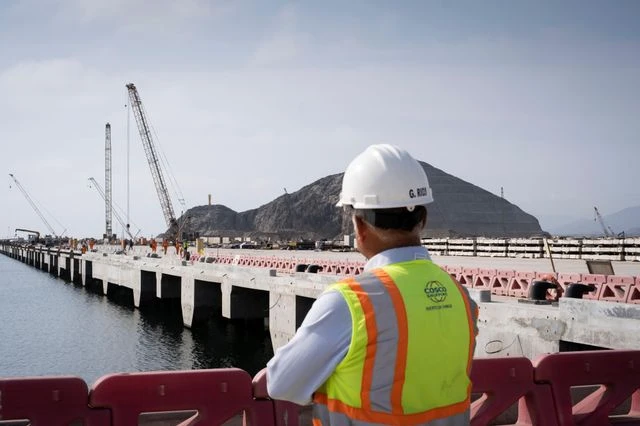By Simone Iglesias, Daniel Carvalho and Beatriz Reis In Brazil’s westernmost state of Acre, a gleaming new section of highway is being built to carry President Luiz Inacio Lula da Silva’s hopes of economic transformation.
It also risks bearing the full weight of Donald Trump’s protectionist policies.
The construction of a bridge and access roads over a 10 kilometer (6 mile) corridor leading to the Peruvian border may seem like a modest project for such a load. Its significance lies in being part of a whole network of new or upgraded arteries intended to link Brazil’s vast territory to its South American neighbors, from there to the Pacific Ocean — and on to China.
Brazil’s geography and colonial history meant that it’s traditionally looked to the Atlantic for commerce. Now, under the president universally known as Lula, it’s deepening ties with the Asia Pacific. The new road and rail system will cut the journey time of goods to Chinese ports by 10-12 days, and has the potential to add one percentage point — or some $22 billion — to Brazil’s GDP per year, according to conversations with officials and Ministry of Planning documents seen by Bloomberg News.
The infrastructure build-out is part of Lula’s grand plan to move Brazil up the value chain and develop economically, with Beijing’s help as key. It’s a strategy that will be on show when Chinese President Xi Jinping swings through Latin America, first for the Asia-Pacific Economic Cooperation forum in Peru this week, then the Group of 20 summit hosted by Lula in Rio de Janeiro, and culminating in a state visit to Brasilia. )
)
More From This Section
But it’s a path that raised hackles in the US even before Trump’s election victory, with the Biden administration cautioning Brazil against deeper engagement with China and warning it off joining Xi’s signature Belt and Road infrastructure program. Given Trump’s calls for tariffs of up to 60 pre cent on Chinese imports, his administration threatens to be more aggressive still in confronting allies willing to break ranks on Beijing.
Lula is unbowed. Brazil already shares geopolitical goals with China, through the BRICS group of which they are both founding members and their joint proposal to end Russia’s war on Ukraine. Dilma Rousseff, Lula’s chosen successor as Brazilian president until she was impeached and removed from office in 2016, now heads the New Development Bank in Shanghai.
At a time when China is facing mounting obstacles to trade with the US as well as with European countries, Lula sees an opportunity for Latin America’s largest economy, according to four people with knowledge of the thinking in his government. All asked not to be named discussing sensitive investment matters.
Emboldened, Lula wants to take advantage of the Belt and Road without formally joining the initiative. His government is seeking Chinese participation in four projects: a domestic infrastructure program; regional integration routes; Brazil’s transition to clean energy; and industrial modernization. Brazil is in negotiations with China over funding, and wants to take the relationship beyond the export of commodities like iron ore and agricultural products, the people said.
Lula was typically combative in an August interview with a local news website in which he said the Chinese want to bring up the Belt and Road Initiative in his meeting with Xi. “We’re not going to close our eyes,” he said. “We’re going to say: ‘What’s in it for us?’”
China’s foreign ministry dispatched a delegation to Brazil in late October to prepare for Xi’s visit, with bilateral ties seen as good overall and no fundamental disagreements, according to a source close to the ministry. China is willing to build on its investments in the country, which already range from agriculture to electric vehicles, and sees Brazil as an ideal base for manufacturing as well as a gateway to other countries in Latin America with which it has free-trade agreements, the person said, asking not to be named as they are not authorized to speak to media.
The decision has been taken “to move our strategic partnership into a new, broader phase, and if the Chinese include the Belt and Road, we have no problem with that,” said Celso Amorim, Lula’s chief foreign policy adviser. “It’s neither in nor out, they can call it whatever they like.”
Washington is less blasé. Speaking at Bloomberg New Economy at B20 in Sao Paulo in October, US Trade Representative Katherine Tai said she “would encourage our friends in Brazil to look at the risks” of closer ties to China, and to “really think about what the best pathway is forward for more resilience in the Brazilian economy.”
President Joe Biden is expected to meet with Xi on the sidelines of APEC in Peru on Saturday, then travel on to the G-20 in Rio, with a stopover in the Amazonian capital of Manaus to meet with local leaders working to preserve the rainforest. It just so happens that Chinese companies including carmaker BYD Co. have a strong presence in Manaus.
“It’s in Brazil’s economic interest not to choose sides in this feud between its top two trade partners. Its trade with China is more than double that with the US, but while the US receives mostly manufactured goods from Brazil, over three-quarters of Brazilian exports to China are commodities. The stock of American foreign direct investment in the country is over six times as large as Chinese FDI, but the latter is rising faster. If Trump intends to to use bilateral deals to tackle the US trade deficit, Brazil isn’t likely to be a priority as the US has a small surplus in its trade with Brazil.” — Adriana Dupita, Bloomberg Economics
Chinese investments have been advancing across Latin America in areas including electric mobility, renewable energy, urban infrastructure and high-end manufacturing. In the decade and a half to 2022, China invested some $96 billion in the countries of the Mercosur trade bloc — Brazil, Argentina, Uruguay, Paraguay and most recently Bolivia — and has said it plans to raise that amount to $250 billion by 2025.
A key conduit for investments will be the Chinese-owned port of Chancay in Peru, which when operational will be the first on the continent’s Pacific coast able to handle the largest container vessels traveling directly between Asia and South America. Much of Brazil’s new transport infrastructure will ultimately lead to Chancay. Xi is expected to inaugurate the port during his trip.

)
)
)
)
)

